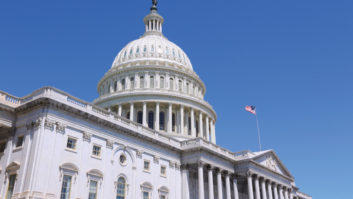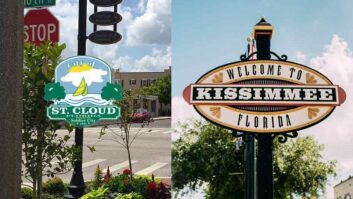 Detailed rules involving licensing, fees, penalties and the nature of what defines a nonprofit station all came together when the Federal Communications Commission responded to an objection filed against a licensee operating two translators in Georgia.
Detailed rules involving licensing, fees, penalties and the nature of what defines a nonprofit station all came together when the Federal Communications Commission responded to an objection filed against a licensee operating two translators in Georgia.
Renewal applications were filed in December 2019 by Immanuel Broadcasting Network for two FM translator stations — W241AF in Rossville, Ga., and W271CV in Atlanta. The first is licensed to rebroadcast WKXJ(FM), owned by Entercom License LLC in Walden, Tenn., while the second is licensed to rebroadcast station WTZA (AM), owned by Radio Spice LLC.
[Read: FCC Nixes Idea to Rebrand NCE Translator as Commercial]
In March 2020, an informal objection was filed by Triangle Access Broadcasting, of Raleigh, N.C., alleging three things: that Immanuel submitted its application for the translators without the necessary application fees; that Immanuel previously did not pay required application fees for W241AF when it initially licensed the station; and that Immanuel has not paid required regulatory fees outright for either of the translators.
According to Triangle, Immanuel does not qualify for regulatory or application fee exemptions available to licenses of noncommercial educational stations because the translators, according to Triangle, have been operating as commercial stations. Specifically, W241AF retransmits WUSY, licensed by Entercom, as well as W271CV, licensed to Radio Spice. Although Immanuel is a nonprofit entity, Triangle said, it may not claim the nonprofit regulatory fee exemption because it uses the translators for a commercial purpose — contrary to the religious, charitable or educational mandates the Internal Revenue Code.
Triangle also argued that the commission’s rules are “clearly intended to exempt bona fide noncommercial stations from paying fees while subjecting commercial users to fees” and that nonprofits are not exempted from regulatory fees when they operate commercially.
Finally, Triangle argued that even under a nonprofit claim, Immanuel has “operated outside the framework of the Commission Policy on Noncommercial Nature of Educational Broadcasting,” by airing political advertisements.
Accordingly, Triangle urged the commission to allow the licenses for the translators to expire.
The Media Bureau agreed with one of Triangle’s allegations. While the bureau recognized that Immanuel is a nonprofit entity, it found that the licensee does not qualify for the nonprofit application fee exemption because this exemption is limited only to those nonprofits that operate in special emergency radio and public safety radio services.
Similarly, the NCE stations in the FM band are exempt from paying application fees. But to determine if a translator is an NCE station or not, the bureau looks at its primary stations’ status — is it NCE or commercial? According to the applications, W241AF and W271CV rebroadcast stations WKXJ and WTZA, each of which is a commercial station owned by commercial entities.
“We find that translators operate as commercial translators and are not entitled to claim the NCE exemption,” the Media Bureau said in its ruling. Therefore Immanuel should have paid application fees for the translators when it filed its initial application.
FCC rules say that if a fee nonpayment is discovered within 30 days of filing, the application is dismissed and can be refiled again. If the payment isn’t discovered after 30 calendar days, the commission will bill the filer the amount that is due plus a 25% penalty.
In this case, the applications were submitted without the fee and 30 days elapsed since that date. That means the commission will bill Immanuel retroactively and impose a 25% penalty.
But the commission disagreed with the allegation that Immanuel is required to pay regulatory fees for the station too. The bureau said that Immanuel established its status as a nonprofit station under section 501 of the IRS code. “Because nonprofit entities are exempt from regulatory fees,” the bureau said, “we conclude that Immanuel is not required to pay regulatory fees for the stations.”
Finally, the bureau said that Triangle’s argument that Immanuel may not air advertising is a faulty one. The translators are commercial stations and thus the section against advertising — which applies only to noncommercial stations — is inapplicable here. “Moreover, the determination of whether Immanuel is prohibited from airing political advertising under section 501(c)(3) is a determination to be made by the IRS, not the commission,” the bureau said.
As a result, the bureau granted part of Triangle’s informal objection and denied parts of it as well. The bureau also ordered Immanuel to pay a penalty charge equal to 25% of the still-unpaid application fee, which equals $175.






